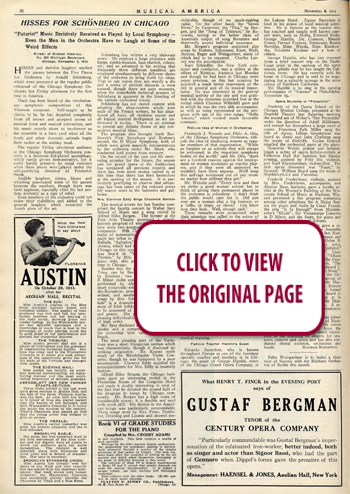 100 YEARS AGO ... IN MUSICAL AMERICA (21)
100 YEARS AGO ... IN MUSICAL AMERICA (21)
November 8, 1913
Page 36
HISSES FOR SCHÖNBERG IN CHICAGO
“Futurist” Music Derisively Received as Played by Local Symphony—Even the Men in the Orchestra Have to Laugh at Some of the Weird Effects
Bureau of Musical America, No. 624 Michigan Boulevard, Chicago, November 3, 1913.
HISSES and derisive laughter marked the Pauses between the Five Pieces for Orchestra by Arnold Schönberg, which were presented at the regular public rehearsal of the Chicago Symphony Orchestra last Friday afternoon for the first time in America.
Much has been heard of the revolutionary symphonic compositions of this Viennese composer. Self-taught as he claims to be, he has departed completely from all known and accepted tenets of musical form and musical convention, and his music sounds about as incoherent as the ensemble in a barn yard when all the fowls and other domestic animals begin their racket at the midday meal.
The regular Friday afternoon audience at the Chicago Symphony Orchestra concerts is a decorous kid-gloved assemblage, which rarely grows demonstrative, but it could hardly preserve its usual restraint when these pieces were played under the self-sacrificing direction of Frederick Stock.
Audible laughter, titters, hisses and whistling punctuated some of the pauses between the numbers, though there was faint applause, especially after the last section, evidently as a sign of relief.
Even members of the orchestra could not resist their risibilities and added to the general laughter which rewarded the fourth piece of the set.
Schönberg has written a very elaborate score. He employs a large orchestra with harps, contra-bassoon, bass-clarinet, celeste, etc., and so advanced is his writing that frequently three different tonalities are employed simultaneously by different choirs of the orchestra to bring forth his ideas. That to our minds they are merely a din and a series of strident discords is most natural, though there are sane moments, when the remarkable technical acumen of Schönberg is apparent in the blending of the various orchestral voices.
Schönberg has not rested content with adopting the ultra-modern whole tone scale of the French writers, he has abandoned all form, all rhythmic accent and all logical musical development as we understand it to-day. There is no attempt to present any definite theme or any consecutive musical ideas.
The program also brought forth Beethoven's First Symphony and Brahms's second, the D Major Symphony, both of which were given masterly interpretations by the orchestra under Mr. Stock, who conducted both scores from memory.
On the record of the past and the interesting promise for the future, the season sale for grand opera at the Auditorium has surpassed all previous records and there has been more money cashed in at this time than there has been heretofore at the opening of the season. It is particularly gratifying to observe that advantage has been taken of the reduced prices for season seats in the balconies and galleries.




 RENT A PHOTO
RENT A PHOTO





